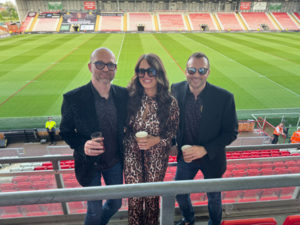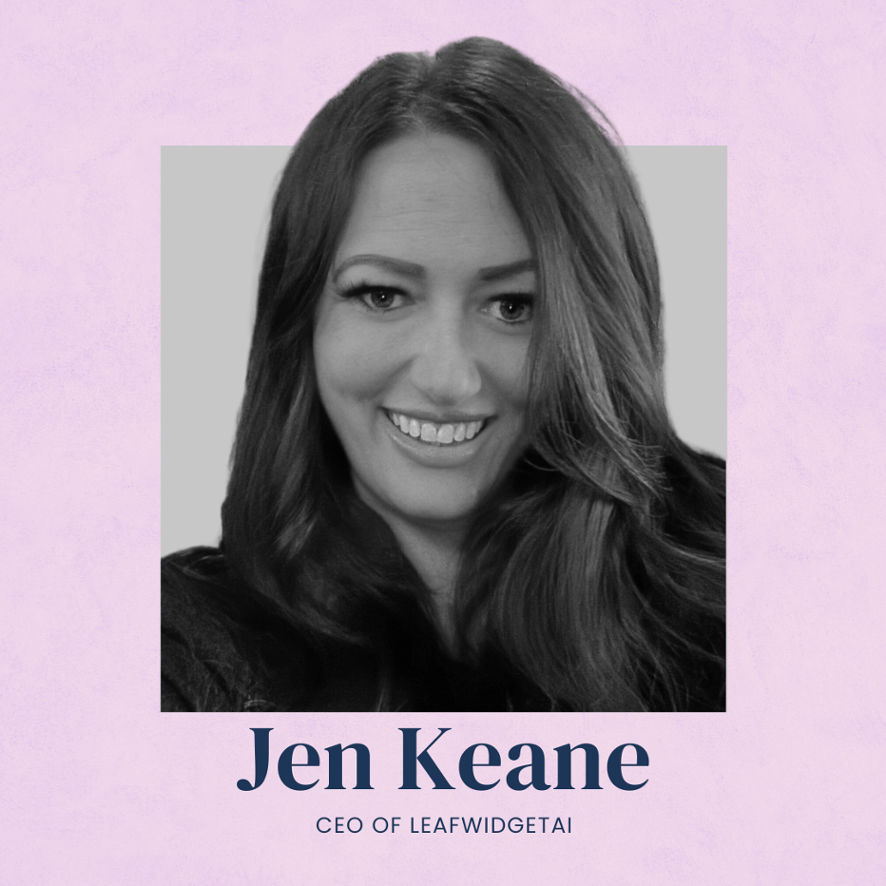CATEGORIES
Inclusion and Impact | Leadership and Networking | People We AdmireOverview:
- Jen comes from a small family situated in a country town in Beaver Creek, Oregon.
- Jen entered the automotive industry at a young age and worked her way up to become a CEO, Partner, and Director.
- Throughout her life, Jen has focused on helping people and learning from the best part of who they are.
- Jen is family-oriented, values her time with loved ones, and has learned everything she needs from her parents and her sister.
- Jen is passionate about helping others and volunteers with several foundations to make a difference in people’s lives.
1. Could you tell us a bit about your childhood and how your early experiences influenced who you are today?
I grew up in Beaver Creek, Oregon, which is a small country town outside of the Portland suburbs. I grew up with my mom, dad, and sister—just the four of us, a tight little family. We didn’t grow up poor, but we didn’t have a lot of money either, so we grew up just like your usual middle-class family. My mom was a school teacher, and my dad was a mechanic. My sister and I are fifteen months apart, so we’re really close as well.
My mom was diagnosed with multiple sclerosis when I was six, and she’s had it now for 36 years. She had to stop working at a younger age, and it was an interesting dynamic for my sister and me, being so young, that we took on the role with my dad—not as parents, but as caregivers. We helped around the house and took care of her.
Even though some people might think that’s a sad situation, I actually think it helped us realize what really matters and grow closer over time. My parents live directly across the street from me now. My dad is like a superhero and has stood by my mom, taking care of her like the best caregiver ever. My sister still lives with me, too. We’ve basically lived together our whole lives, and I’m 40 now and she’s almost 39.
Growing up in such an environment shaped me to want to help people and make an impact. I started working young because we had to help the family. Growing up in a blue-collar family, I always had the desire to do more, be more successful, and take care of my parents when I got older. I didn’t go to college. I went to high school and then straight out of high school, I got into the automotive industry.

2. What are your most important life values and how do you think they’ve contributed to your career progression and your current positions as CEO, Partner, and Director?
I’d say my passion has always been about people and helping them whether it’s connecting with people, taking care of them, or just being there for them. That’s always been at the forefront for me. When I got into the automotive industry, I was one of the only women of that age. So, it became really important to me to get more women involved in the industry. I wanted to help women grow and move into positions where they could make an impact.
When I first started, I wasn’t in charge or managing anyone, so I couldn’t directly influence hiring or promoting women. However, as I worked my way up, I saw how well women could thrive in the automotive industry. I wanted to help bring in more women and create opportunities for them. That’s been a big focus of mine throughout my career, especially now, as a CEO. I’m always advocating for getting women into leadership roles, not just in automotive, but in any industry. We’re still working on diversifying, and it wasn’t that long ago when the situation was much worse. So, that’s been a constant focus for me.
In terms of life values, for me, it’s always been about treating people how you want to be treated. I’ve always had this sense that things will work out in the end. Staying positive is such an important way to live. When you do the right thing and take care of people, it comes back to you in unexpected ways—not always financially, but in ways that matter. My family and I have faced a lot of struggles and negative situations, but we’ve always managed to overcome them. I believe that’s because we’ve tried to live by doing the right thing and helping others.
One of my personal life values is putting family first. I know that’s not the same for everyone because not everyone has the same family dynamic, but for me, it’s always been important. Another big life value for me is trusting yourself, and following my gut and intuition. Especially as a woman, having confidence and believing in yourself is so important. You can’t let other people dictate who you are or how you feel.
I think a lot of this comes from my dad. He raised my sister and me to know our worth and be strong from a young age. But when I say “strong,” I don’t mean holding in your feelings or not saying what you think. For me, strength is the opposite, being open, honest, and true to yourself.
3. Can you share how your passion for helping people has influenced your entrepreneurial journey?
I think it all goes back to helping people. When you help others, they want to help you too. People want to work with you, work for you, and lift you up. In terms of my success, I wouldn’t be where I am without the mentorships I’ve had and the people around me who gave me opportunities. These opportunities allowed me to be innovative, creative, and have the freedom to explore ideas. I’ve always tried to do the right thing, helping people get where they need to be without expecting anything in return. I’ve found that when you don’t expect anything, you often end up getting more in return. For me, it’s simple: helping others helps you. That’s been a key part of my journey, focusing on doing good for others and trusting that things will come back around.
4. How do you balance advising companies across various industries with different operational needs?
I think it starts with being organized, but more importantly, it’s about building personal relationships with everyone involved and not just the leaders. Spending time getting to know each person in each industry, and understanding what their expectations are is important. Just because something works for one organization doesn’t mean it’s going to work for every other organization out there.
It comes back to getting to know people, asking questions, and actually listening. It’s about taking what they need and implementing it as best as I can, in a way that gets the job done. In the end, we all have a lot of the same needs personally, and if you can find a way to create a solution based on that, everything else tends to fall into place.
If someone trusts you and likes you, they’re more willing to try something new, even if it’s not a process they would’ve normally done. That trust is key—knowing that I’m on their team and working toward the same goals.
Of course, being organized is crucial, and making sure I’m dedicating enough time to each industry and client so they all get what I’ve promised. I also believe in under-promising and over-delivering. That way, I can exceed expectations and build even stronger relationships in the process.

5. How do you perform HR-related activities —advising on operational activities, employee culture, and retention while being an empath?
One thing I’ve noticed, especially in industries such as consulting, is that there are a lot of older men and women—mostly men—who say they want more women in the industry. They talk about it, but they don’t always want to deal with what that actually requires. It’s interesting because, honestly, men are just as sensitive, if not more sensitive, in most of the industries I’m in. But culturally, they’ve been taught not to show emotions, not to act that way, even though they’re feeling it.
Women, on the other hand, are usually more likely to show emotion, to express how they feel. And thankfully, in the world we live in now, there are many more companies encouraging women to speak up, share their opinions, and give input.
Many workplace issues stem from generational norms, where leaders haven’t been encouraged to consider new approaches. Normalizing changes like paternity leave and spaces for women to breastfeed starts with open conversations at the top, showing it’s okay to break from tradition.
A lot of traditional companies have always done things the same way. No one’s ever told them they as leaders can set the direction for change. And once that happens, it’s all about letting people have a voice. Everyone has opinions, and they just want to feel like they’re part of something.
It’s about creating a space where people can share their feelings—whether they’re good, bad, happy, or sad—in a safe environment. People need to feel like they can talk freely, and leaders need to be open to feedback, even if it’s critical. It’s the only way we can keep evolving as leaders.
The truth is, the people who work for you are the ones who will tell you the hard truths. They’ll say, “Hey, you’re not doing this right,” or “You need to change this.” Your business buddy down the road isn’t going to say that. So, being open to hearing what people feel, even if it’s not what you want to hear, is crucial for growth.
6. How do you handle conflicts or disagreements with team members?
I’ve learned that it’s important to let people speak and really listen to what they’re saying. Sometimes the issue they think is the problem isn’t actually the real issue. By listening and trying to understand things from their perspective, even if you don’t agree or fully understand, you can get a more clear picture.
In any relationship, just because you don’t share the same feelings doesn’t mean they aren’t valid. Everyone deserves to feel how they feel, and it’s important to recognize and respect that, even if you disagree. You might not be able to change their feelings, but understanding their point of view and validating their experience can go a long way.
In a business setting, actively hearing someone out can address most problems effectively.
7. What sparked your interest in joining the Humane Society of Central Oregon and what impact has your involvement made in the community?
I would say the reason I volunteer is because I’m thankful for what I’ve got. I believe I’ve gotten where I am because people have volunteered their time to teach me, build the company, or support me in some way. People have put in their time, and I think it’s important to give back, not for financial benefit, but because it’s the right thing to do.
Of course, you do gain other benefits, like meeting incredible people. For example, I’ve even hired coworkers through connections I’ve made while volunteering. But the real inspiration behind it is being part of things that may not be my expertise or industry, but that I’m passionate about. Whether it’s the people or the cause, it’s fulfilling to contribute to something bigger than myself.
What I love about volunteering, especially through foundations, is the sense of community it brings. When you gather people together for a good cause—whether it’s 20 or 100 people—it creates an incredible energy. That collective effort is powerful, whether it’s helping animals, supporting our service members through The Valor Foundation, or working with the MS Foundation to find a cure.

8. What is one current trend/ or an outlook that you see in the future that excites you about your industry?
In my opinion, there will always be a need for human interaction, but companies might think they won’t need as many people. That’s why I think we’re going to see the best of the best, those who truly stand out. I’m excited to see that unfold and to witness who steps up in this rapidly changing world.
It’s hard to put into words, but I believe the next fifty years are going to be fascinating. People are incredibly smart, and so many innovations are being built right now. I think this will bring the world closer together. Imagine the impact we can have when we all put our minds together. I think we’ll see more of this—people from different places and perspectives coming together.
For a long time, companies had this attitude of, “We don’t hire outside of the US,” or “We don’t bring in people from outside the UK.” But I think that’s changing. It’s going to require more collaboration, and more roundtable discussions like this, where different outlooks are brought together. That’s what really excites me—the potential for us to share ideas and perspectives from all over the world.
9. What would you tell your younger self just starting as an entrepreneur and volunteer?
Start early. As early as you can. I think it’s all about helping people, in whatever way you can. It doesn’t matter what it is—just get involved. You’ll be surprised by the paths it takes you down and the people you meet. The great thing about volunteering is that there’s no age limit. You get to work alongside such a wide range of people, even kids. I’ve started bringing my son to volunteer with me—whether it’s buying Christmas gifts for those in need or feeding the homeless. It doesn’t matter what you do, just start young. Volunteering helps build a compassionate heart, and that’s something the world could definitely use more of.
Conclusion:
Jen’s passion for championing others reflects her lifelong commitment to making a difference in the world around her. The care-taking responsibilities she took on early in her childhood helped her understand the value of resilience and helping others. For Jen, success is measured by the impact she has on the lives of others.


